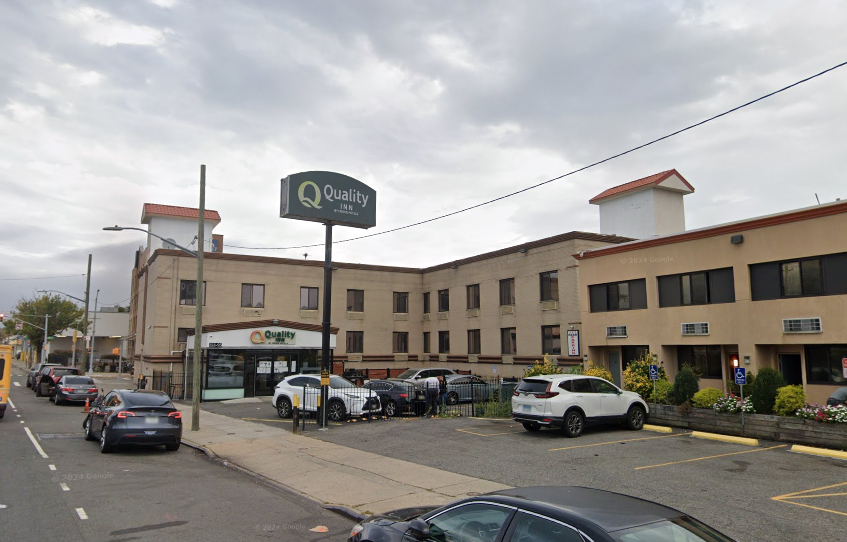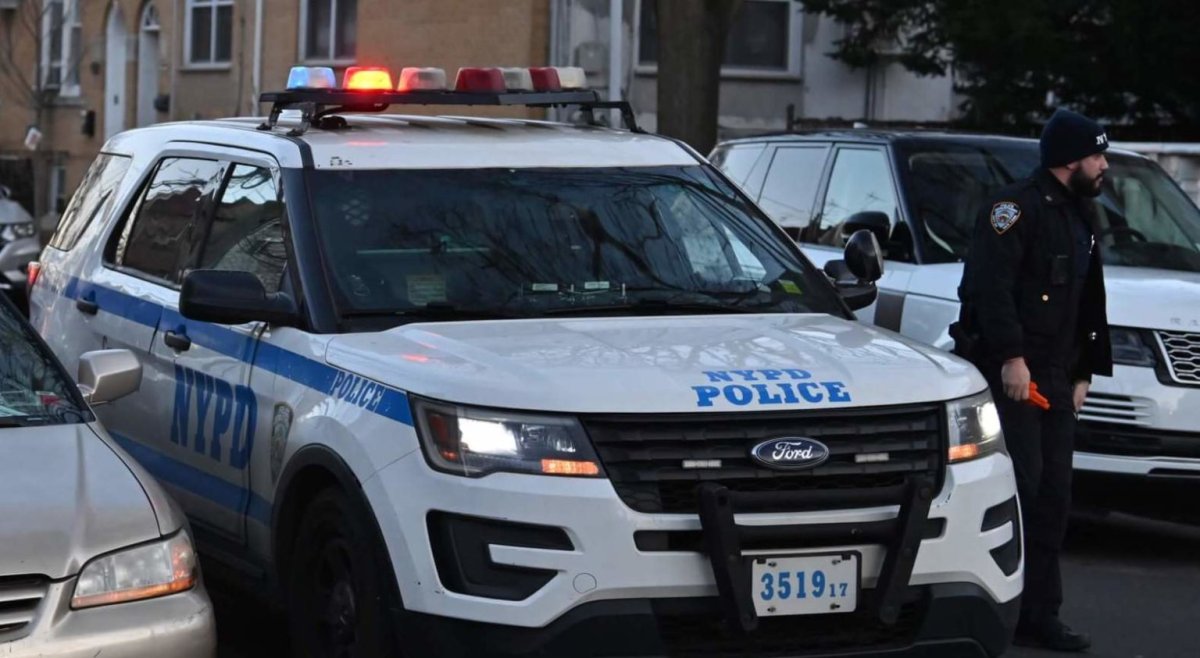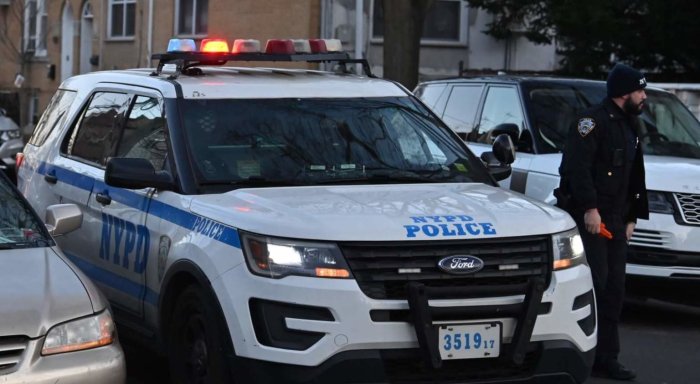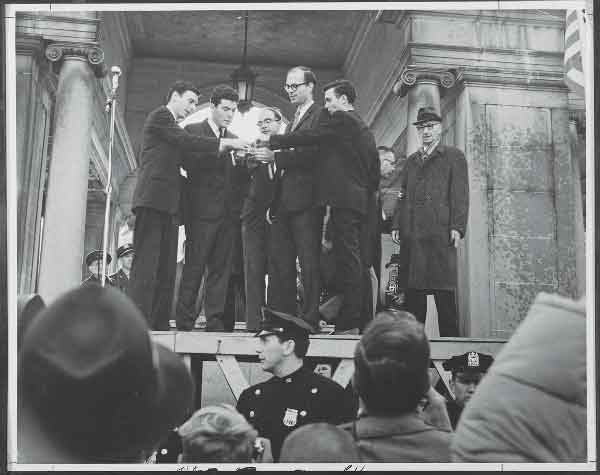
Draft-card burners in 1965 at the Union Square Pavilion, from left, Tom Cornell, Marc Edelman, Roy Lisker, David McReynolds and Jim Wilson. Dutch-born clergyman and activist A.J. Muste is at right in hat and topcoat.
BY MARY REINHOLZ | At the Catholic Worker’s residential Maryhouse last Friday night, three grizzled anti-war activists marked the 50th anniversary of burning their draft cards on Nov. 6, 1965, in opposition to the Vietnam War with two other pacifist comrades in Union Square. They did the incendiary deed with some difficulty before a raucous crowd of about 1,500, among them counterdemonstrators who chanted and carried signs saying, “Burn yourself instead of your card.”
One man doused the radical peaceniks with water from a fire extinguisher, an event captured in a short documentary film shown to a group of about 50 apparent lefties gathered in the decidedly funky Maryhouse auditorium at 55 E. Third St. The footage also showed a swarm of police, some reportedly perched on rooftops, concerned about the prospect of sniper attacks on the card burners.
The cops formed a corridor and escorted them to safety to a Lower Manhattan office, recalled Tom Cornell, an associate editor at the Catholic Worker newspaper and a Catholic deacon who was one of the trio of aging draft-card burners and speakers on stage.
Cornell, born in 1934, said the card burning was also designed to show defiance to a bill signed two months earlier by President Lyndon Baines Johnson that made damaging or mutilating a draft card a federal offense.
“There was no legislative purpose to that law,” he said. “It was meant to stifle dissent. It was meant to intimidate.”
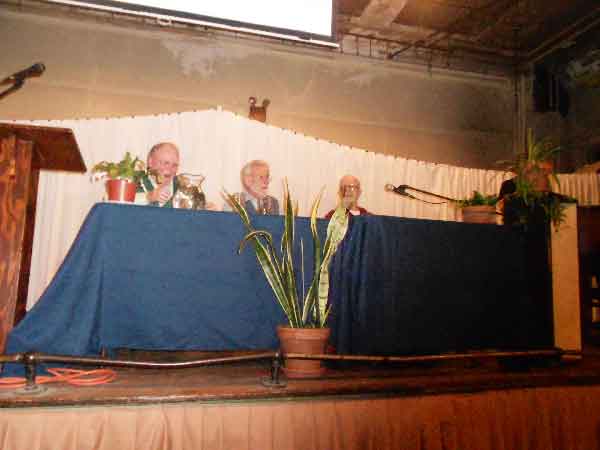
Speaking at Maryhouse last week, ’65 draft-card burners, from left, Jim Wilson, Tom Cornell and Dave McReynolds.
He noted that Dorothy Day, co-founder of the Catholic Worker movement who is now a candidate for sainthood in the Roman Catholic Church, spoke “for the first time outdoors” at the Union Square rally. Cornell also claimed that Dutch-born pacifist clergyman A.J. Muste, who was there, called it “the most successful demonstration since World War II.”
But while the card-burning theatrics were successful as agitprop, garnering front-page coverage in The New York Times on a Sunday (Cornell said two young Timesmen gave explicit instructions on how to get maximum impact) and publicity from other papers across the country, it stirred tragic consequences.
Three days later, a young Catholic Worker volunteer named Roger Allen LaPorte went up the United Nations, “sat in front of the Secretariat building at 5 o’clock in the morning, set himself on fire and died” at Bellevue Hospital at 22, said famed pacifist and socialist David McReynolds, 86, the retired longtime national secretary of the War Resisters League, who had also burned his draft card that long-ago Saturday in Union Square.
“It’s impossible for me not to accept some sense of responsibility for Roger La Porte,” said McReynolds, adding, “I think he was trying to absorb the violence.” His protest was one of several self-immolations protesting the war in Vietnam.
McReynolds, an atheist who lives in the East Village, described his decision to burn his draft card as “an act of penance” for supporting President Johnson the year before.
“I thought he would stop the slide to war,” he recalled. “I felt so betrayed by the horror of Vietnam.”
All of the five draft-card burners were eventually arrested and most served short prison sentences, except for McReynolds, who by then was too old to be inducted. Jim Wilson, now about 70 and active back then in the Catholic Movement “by way of Selma,” received the harshest penalty — two years of hard time behind bars from a three-year sentence for failing to report for induction. He was 20 or 21.
“I was the youngest of the group,” Wilson said, noting he first got off easy with a two-year suspended sentence and two years probation for draft card burning. But while on probation, his draft board ordered him to report for induction — “which I refused. I was arrested in December of 1966. The judge sentenced me to three years and I went two years,” he said.
At one point during his time behind bars, Wilson was taken by prison guards to Foley Square and faced a U.S. district judge and a government prosecutor who sought to impose five years for every day that he had allegedly violated his probation by not reporting for induction.
“The judge looked at me and said: ‘Mr. Wilson, how do you plead?’ I said, ‘Guilty, your honor.’ The judge said, ‘I don’t think you understand the seriousness of this.’ ”
That’s when Wilson called renowned civil liberties lawyer William Kunstler, who represented him at the next court hearing. The judge rejected the government’s arguments for extra time and sent Williams back to prison where he finished his term.
“There was a community in prison and community outside of prison,” he recalled. “A lot of people came — hundreds of thousands that were refusing induction. The jails weren’t big enough. It was an important thing to do.”



